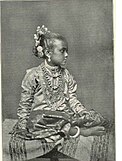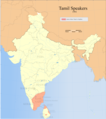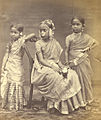Portal:Tamils
 From Wikipedia the free encyclopedia
From Wikipedia the free encyclopedia
The Tamils portal The Tamil people, also known as Tamilar (Tamil: தமிழர், romanized: Tamiḻar, pronounced [t̪amiɻaɾ] in the singular or தமிழர்கள், Tamiḻarkaḷ, [t̪amiɻaɾɡaɭ] in the plural), Tamilians, or simply Tamils (/ˈtæmɪlz, ˈtɑː-/ TAM-ilz, TAHM-), are a Dravidian ethnolinguistic group who natively speak the Tamil language and trace their ancestry mainly to India's southern state of Tamil Nadu, to the union territory of Puducherry, and to Sri Lanka. The Tamil language is one of the world's longest-surviving classical languages, with over 2000 years of Tamil literature, including the Sangam poems, which were composed between 300 BCE and 300 CE. People who speak Tamil as their mother tongue and are born in are considered Tamils. Tamils constitute 5.9% of the population in India (concentrated mainly in Tamil Nadu and Puducherry), 15% in Sri Lanka (excluding Eelam Moors), 7% in Malaysia, and 5% in Singapore. From the 4th century BCE, urbanisation and mercantile activity along the western and eastern coasts of Tamilakam -- what is today Kerala and Tamil Nadu -- led to the development of four large Tamil empires, the Cheras, Cholas, Pandyas, Pallavas, and velirs and a number of smaller states, all of whom were warring amongst themselves for dominance. The Jaffna Kingdom, and vanni chieftaincies inhabited by Eelam Tamils, was once one of the strongest kingdoms of Sri Lanka and controlled much of the north of the island. (Full article...) Selected article -There are literary, archaeological, epigraphic and numismatic sources of ancient Tamil history. The foremost among these sources is the Sangam literature, generally dated to 5th century BCE to 3rd century CE. The poems in Sangam literature contain vivid descriptions of the different aspects of life and society in Tamilakam during this age; scholars agree that, for the most part, these are reliable accounts. Greek and Roman literature, around the dawn of the Christian era, give details of the maritime trade between Tamilakam and the Roman empire, including the names and locations of many ports on both coasts of the Tamil country. There are evidences as could be seen comparing standard forms of Sumerian literature and those recovered through present form of Tamil, for example the word for father in Sumerian transliteration is given as, "a-ia" that could easily be compared with Tamil word, "ayya". This also places ancient form of Tamil to early Sumerian period, say as ancient as 3500 BC. Archaeological excavations of several sites in Tamil Nadu and Kerala have yielded remnants from the Sangam era, such as different kinds of pottery, pottery with inscriptions, imported ceramic ware, industrial objects, brick structures and spinning whorls. Techniques such as stratigraphy and paleography have helped establish the date of these items to the Sangam era. The excavated artifacts have provided evidence for existence of different economic activities mentioned in Sangam literature such as agriculture, weaving, smithy, gem cutting, building construction, pearl fishing and painting. (Full article...)General imagesSelected biography -Ranganathan Madhavan (born 1 June 1970) credited as R. Madhavan, informally known as Maddy, is an Indian actor, writer, director, and producer who predominantly appears in Tamil and Hindi films. Over the course of his career, he has been a recipient of several accolades including one National Film Award, four Filmfare Awards South, two Tamil Nadu State Film Awards and five SIIMA Awards. Currently, he serves as the President of Film and Television Institute of India (FTII), Pune. Madhavan gained recognition in Tamil cinema by starring in Mani Ratnam's romantic drama film Alai Payuthey (2000). He soon developed an image as a romantic hero with notable roles in two of the highest-grossing Tamil films of 2001, Gautham Vasudev Menon's directorial debut Minnale and Madras Talkies' Dumm Dumm Dumm. He had further box-office hits with films, such as Run (2002), Jay Jay (2003), Thambi (2006) and Rendu (2006). He also gained praise for his performances in Kannathil Muthamittal (2002), Anbe Sivam (2003), Nala Damayanthi (2003) and Aayutha Ezhuthu (2004). In the mid-2000s, Madhavan also actively pursued a career in Hindi films, by appearing in supporting roles in three highly successful productions, Rakeysh Omprakash Mehra's Rang De Basanti (2006), Mani Ratnam's biopic Guru (2007) and Rajkumar Hirani's comedy-drama 3 Idiots (2009), which went on to become the highest-grossing Indian film of all time at the time of its release. During this time, Madhavan also simultaneously continued working in Tamil cinema with the films Evano Oruvan (2007) and Yavarum Nalam (2009). (Full article...)CategoriesTopicsTamil People Countrywide: India • Sri Lanka • Canada • Malaysia • Singapore • South Africa • England Related Ethnic Groups: Brahui • Gond • Kannadiga • Khonds • Kodava • Oraon • Malayali • Telugus • Tuluvas Related indigenous Groups: Badagas • Toda • Kuruba
See also: List of Tamil people, Tamil script, Tamil Script Code for Information Interchange Related portalsWikiProjectsThings to do
Associated WikimediaThe following Wikimedia Foundation sister projects provide more on this subject:
Discover Wikipedia using portals |






























































